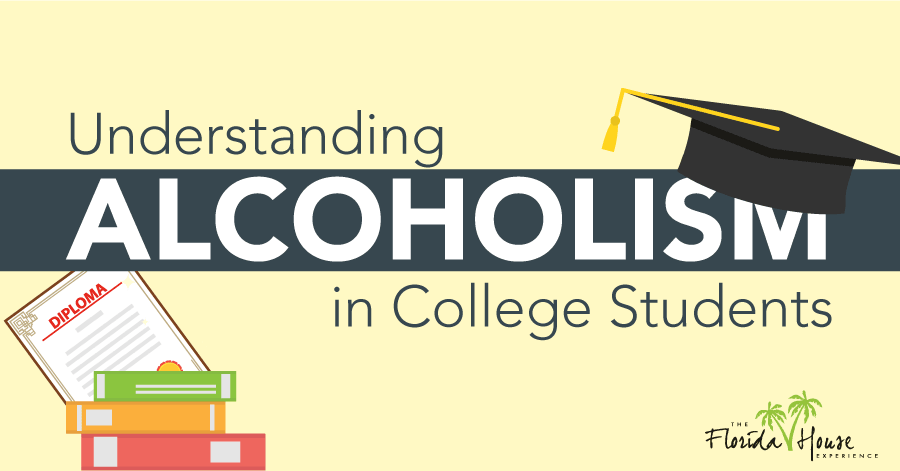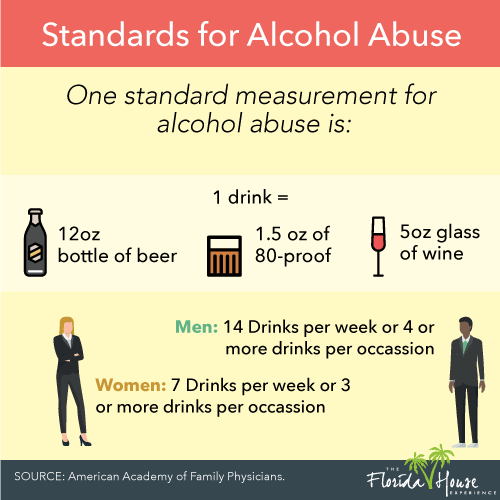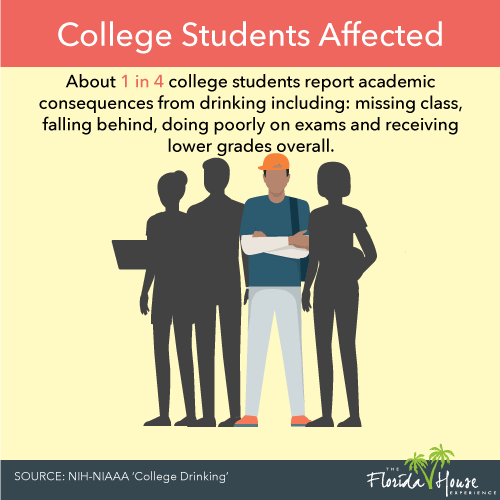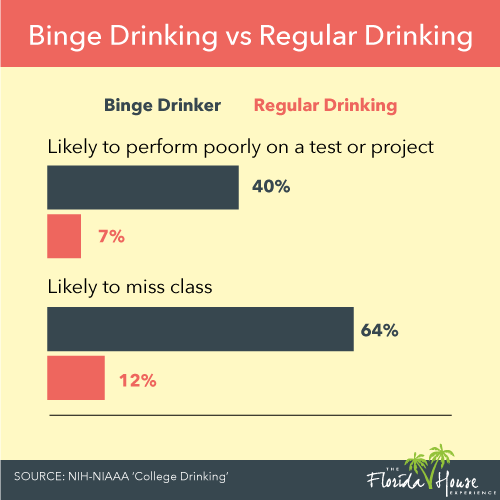
House parties, tailgates, and bars: three of the main hangout spots of all college students. They’re filled with a bunch of people and a lot of fun being had. There’s one more thing they’re filled with though, and that is alcohol. Alcohol, even before they turn the legal age of use, is easily accessible to every college student across America.
This is the main reason college students are likely to start their addiction to alcohol at such a young, developmental time in their life. It is vital that students be aware of the dangers of extended use of alcohol and what it can do to them over time. Otherwise, they will likely end up needing extensive alcohol abuse treatment.
What is Considered Alcohol Abuse?
 Alcohol abuse, or more commonly known as alcoholism, is the pattern of drinking too much alcohol on a regular basis. It causes individuals to become dependent on alcohol for everyday life. Alcoholism affects a person’s ability to go to work and school, perform daily activities and lead a normal life without alcohol consumption. Often times, someone abusing alcohol lets their use affect and come before their personal and professional relationships, as well.
Alcohol abuse, or more commonly known as alcoholism, is the pattern of drinking too much alcohol on a regular basis. It causes individuals to become dependent on alcohol for everyday life. Alcoholism affects a person’s ability to go to work and school, perform daily activities and lead a normal life without alcohol consumption. Often times, someone abusing alcohol lets their use affect and come before their personal and professional relationships, as well.
By standard definition, a typical alcoholic beverage is considered 1 12-ounce bottle of beer, 1 5-ounce glass of wine or 1.5-ounces of distilled 80-proof spirits, such as rum, whiskey or tequila. For men, drinking 14 drinks per week or 4 or more drinks per occasion is considered alcohol abuse. For women, the numbers drop to 7 drinks per week or 3 or more drinks per occasion.
College Alcoholism Statistics
 Although there are some young adults that drink excessively before college, many students who develop binge-drinking habits do so during their college years. According to recent statistics, around 60% of college students participate in activities that resulted in drinking alcohol and 2 in 3 of them admitted to it being in binging amounts. As a result, 1 in 4 students who develop an addiction to alcohol reports that it affects them from an academic standpoint. They miss class, fail exams and receive lower overall grades because of their excessive drinking habits.
Although there are some young adults that drink excessively before college, many students who develop binge-drinking habits do so during their college years. According to recent statistics, around 60% of college students participate in activities that resulted in drinking alcohol and 2 in 3 of them admitted to it being in binging amounts. As a result, 1 in 4 students who develop an addiction to alcohol reports that it affects them from an academic standpoint. They miss class, fail exams and receive lower overall grades because of their excessive drinking habits.
Alcohol not only affects the academics of a student’s life, but it also affects the personal aspect of their lives. Around 700,000 students have reported being physically assaulted by someone under the influence of alcohol. Likewise, 100,000 of these students reported being sexually assaulted by someone who was intoxicated or while they were intoxicated themselves. This results in about 1,800 college students between the ages of 18 and 24 dying every year from alcohol-related injuries, like over-consumption and even motor-vehicle crashes.
Why is Drinking Common on College Campuses?
Drinking on college campuses is so common because alcohol is easily accessible in almost every aspect of the college lifestyle. While many underage students have friends who are 21 and older buy them their alcohol, there are also many who obtain fake ID’s that claim they are of age. This allows them to buy alcohol from most convenient stores and to enter bars overage in order to buy drinks. Free alcohol is also supplied at almost any house party or event that pertains to tailgating for sporting events.
Peer pressure also plays a major role in the drinking habits of some students. Young men and women who join clubs and fraternities are often “hazed” in the early stages. Older members can force them to binge drink as one of their tasks to be fully accepted as one of the members. Even if a student chooses not to join one of these organizations, they can still have friends that do that can influence them to participate in these habits, as well.
Dangers of Binge Drinking
 Moderate alcohol consumption, like drinking on special occasions or having a glass of wine with dinner, is a part of life we choose to partake in some days. The problem occurs when “special occasions” are three times a week and one glass of wine during dinner turns into 4 or 5. This is known as binge drinking, and it is a serious problem that some college students face. Some of the dangers that come with it include:
Moderate alcohol consumption, like drinking on special occasions or having a glass of wine with dinner, is a part of life we choose to partake in some days. The problem occurs when “special occasions” are three times a week and one glass of wine during dinner turns into 4 or 5. This is known as binge drinking, and it is a serious problem that some college students face. Some of the dangers that come with it include:
- Weakening of heart muscles which can lead to heart disease and congestive heart failure
- Development of numerous types of cancers such as those of the mouth, esophagus, liver and breast
- Damage to brain cells that can cause long-term memory loss and slow reaction times to dangerous situations
- Contraction of STD’s or becoming pregnant because of impulsive and poor decisions made while under the influence of alcohol
- Becoming injured or even dying in alcohol influenced car crashes and violence
Options Other Than Drinking
Occasional drinking in college, especially once a student has reached the legal age limit, is, of course, going to happen. Although situations and activities that include alcohol consumption can be tempting for college students, there are lots of alternatives that can occupy free time and don’t involve drinking. Students can apply for jobs on campus that allow them to make money and have flexible hours. They can join a religious organization on campus that meets a couple times a week and gives them a group of like-minded students to share common beliefs and values with. There are also options like running for student government and becoming tutors for other students struggling with certain classes.
Help for Students Struggling with Alcohol Abuse
Alcohol abuse is a serious disorder that requires proper education and treatment to fully overcome. Our team at Florida House is prepared to answer any types of questions about what is the best direction to take in order to start the recovery process of alcoholism. There are many treatment options available at our facilities including an alcohol detox program that allows the individual struggling with alcohol addiction to receive the support they need to cut out alcohol completely from their life.
For our extensive survey of college drug use, see our blog Higher Education
Do not hesitate to contact us today at (833) 596-3502 if you believe you or a loved one are in need of alcohol abuse rehabilitation services. Our compassionate team of counselors are standing by to take your call.






